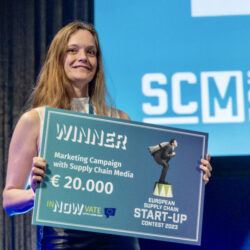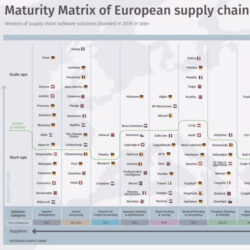Supply chain start-ups still in demand among investors

As applications for the Supply Chain Start-Up Contest pour in from across Europe, scm-startups.com and Supply Chain Media have taken stock of the start-up market on Webinar Wednesday. The main conclusion is that supply chain start-ups are relatively immune to the reticence among investors. “That proves that supply chain as a field is becoming increasingly important. Fortunately, because we have many challenges that demand a solution,” says Markus Börner of scm-startups.com.
By Marcel te Lindert
The number of start-ups in supply chain has grown significantly over the past decade, according to analysis by scm-startups.com, which has recorded the founding year of 343 start-ups. Until 2012, the number of new entries per year could be counted on one hand. That changed in the years that followed, reaching a temporary peak in 2019 and 2020. In both years, Markus Börner was able to add no fewer than 59 new names to his start-up list. “The fact that the peak is in 2019 and 2020 is not a cause for concern. From experience, we know that very young start-ups often still operate under the radar and therefore have not yet been spotted by us.”
Börner, along with Mathias Bosse, is the co-founder of scm-startups.com. The platform provides an overview of supply chain start-ups operating in Europe. “We founded the platform because we saw that many start-ups in the supply chain were having trouble gaining access to the highly fragmented market. We help start-ups create visibility and help companies connect with them. This is important because we have many challenges in the supply chain that demand a solution. Fortunately, we see that supply chain has become an increasingly relevant domain for the start-up scene.”
Focus on sustainability
The increasing relevance is also evident in an analysis of the invested capital. In general, it has become more difficult for start-ups to find capital. Many venture capital funds have become reticent due to the stagnant economy. The supply chain domain, however, is exempt from this trend. While the invested capital in other sectors decreased last year, it remained almost the same in the supply chain. “This also proves that supply chain as a field has become more important. The major venture capital funds continue to invest in supply chain. This does not mean that supply chain start-ups will have an easy time, but it does mean that start-ups in other sectors will have an even harder time.”
Börner does note that the focus within the supply chain domain is shifting. Before 2020, most start-ups were active in areas such as supply chain visibility, digital expedition, and procurement. Their solutions were aimed at digitizing existing, often manual processes. “After 2020, we see that changing. That is not only due to the pandemic and the war in Ukraine but also to the increasing regulations on sustainability. These force companies to monitor their suppliers for sustainability. That is why we see many start-ups in this area.”
Responsible procurement
Sustainability is exactly the domain of Responsibly, winner of the Supply Chain Start-up Contest in 2022. This Danish company was founded in 2021 with just one goal: to enable buyers to purchase responsibly. This requires more than insight into suppliers’ CO2 emissions, emphasizes Chief Product Officer Hope Jeter. “80 to 90% of a company’s footprint is caused by suppliers. This concerns – in addition to CO2 – deforestation and biodiversity, forced labour, and diversity. Governments, investors, and customers no longer accept companies not taking action.”
So far, purchasers have no insight into suppliers’ sustainability performance. If data is available, it is often scattered across documents, spreadsheets, and other databases. Collecting and analysing all that data is time-consuming. “Responsibly offers a scalable platform that enables automatic data collection and analysis, even without actively involving suppliers. Our platform is linked to hundreds of databases, websites, and reports,” explains Jeter.
Caution prevails
Thanks in part to the attention generated by the Supply Chain Start-up Contest, Responsibly looks to the future with confidence. Other supply chain start-ups are generally cautious, although sentiment is not as negative as it was at the beginning of 2020, according to Supply Chain Media’s annual survey of start-ups. “It’s logical that in 2020, just after the outbreak of the pandemic, pessimism prevailed. Ultimately, that situation was not as bad for many start-ups as initially thought,” says Börner.
After hitting rock bottom in 2020, many start-ups were much more positive about their prospects in 2022. This year, the sentiment is slightly more negative due to economic uncertainty. “It has become a bit more difficult to collaborate with partners and acquire new capital. And, like last year, it remains difficult to find new employees,” says Martijn Lofvers, CEO and chief trendwatcher of Supply Chain Media. Responsibly is a bit less negative about attracting new staff. “Our advantage is that we are active in sustainability. Many people want to work for a company that can have a positive impact and are looking for work in the field of sustainability,” says Jeter.
Register before March 20
The winner of the Supply Chain Start-up Contest this year will be announced during the inNOWvate Supply Chain Event on May 11. An expert jury consisting of Martijn Lofvers (CEO of Supply Chain Media), Jean-Baptiste Clouard (CEO of Flowlity), Joost Bous (former CSCO of Action), Mathias Bosse (co-founder of scm-startups.com), and Thijs Gitmans (investor) will evaluate the participating start-ups based on commercial opportunities, degree of innovation, practical applicability, and clarity of message. All candidates listed on the Maturity Matrix 2023 have been approached and can still register until Monday, March 20.










